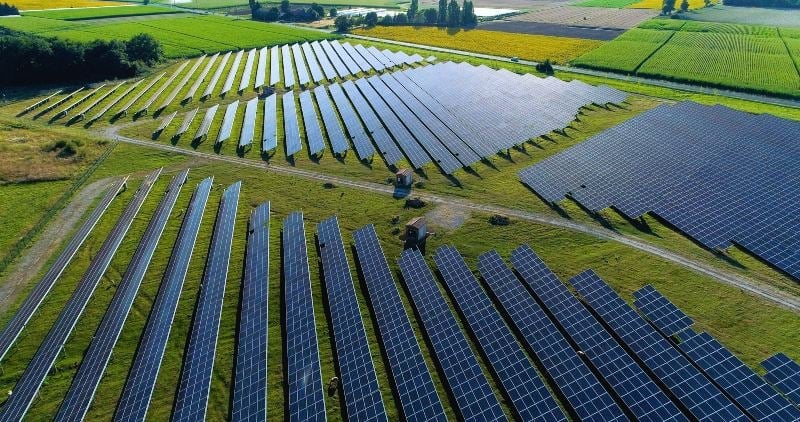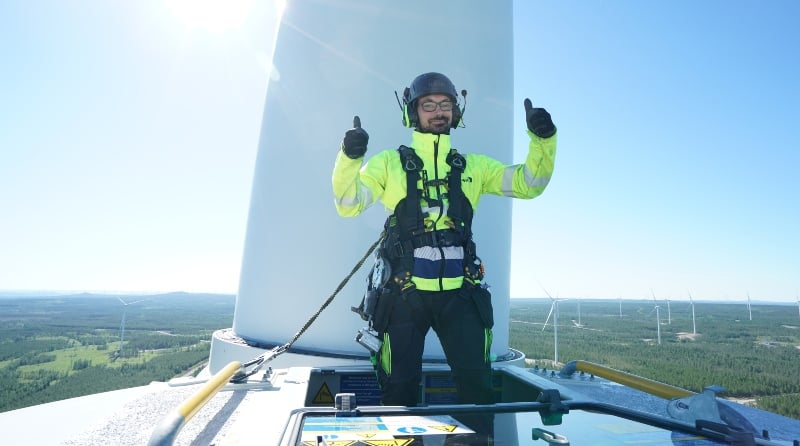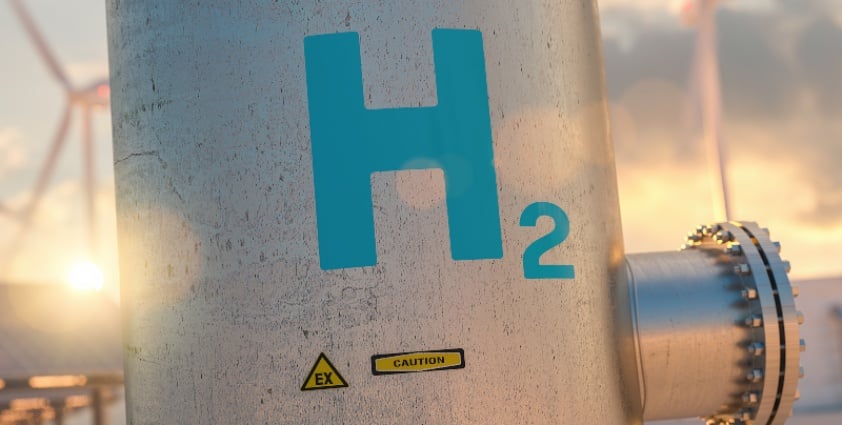Reliable innovations, safe installations and a sustainable future: Kiwa’s role in the energy transition

To maximize the use of renewable energy, innovation needs to break through existing channels, and its implementation must be safe and efficient. Kiwa has an important role to play in ensuring the quality and safety of products and their deployment on the market that are vital for the transition.
In this article, Luca Votta, Global Business Sector Leader Renewable Energy at Kiwa, shares his thoughts on the energy situation today, and what we can do to secure a greener future.

Pressure on energy supply affects quality of life
The ongoing war in Ukraine has put pressure on the gas supply across Europe, highlighting the need for countries to become fuel independent. After experiencing the hottest summer on record in 2022, Europe is now facing a winter with insufficient energy to heat homes.
In Italy, where Luca Votta is based, the government plans to reduce the temperature in public buildings by 1˚C, turn the heating on for two weeks less than usual over the winter period, and reduce the daily duration of that heating by one hour in a bid to save energy.
“When we delay or even fail to implement the proper policy for the energy transition, we are reducing our quality of life in the mid-term,” Luca said.
In the short-term, governments are looking for alternative sources of gas. But in the long-term it’s clear that we need to accelerate the transition to renewable energy, so countries can be fueled by their own solar, wind, green hydrogen and many other renewable powers.
The European Commission is pushing for the deployment of new installations, and that’s where Kiwa comes in.
We changed the name of this business sector from Energy to Renewable Energy a few years ago to send a message to the market that this is the direction we’re moving in. We want to increase the willingness and ability of our clients to move in a different direction and produce energy with low impact, and to support manufacturers to create value in the market.
Today Kiwa provides services for green companies, such as manufacturers and installers of green solutions, as well as for companies that are fossil fuel-oriented and want to diversify their business, with a focus on solar, wind and green hydrogen.

Kiwa’s first solar guy
In a single hour, the sun gives us more energy than the entire world consumes in a year, and this has long been a fascination and focus for Luca. “I’m a solar guy,” he said. After graduating in environmental engineering from Polytechnico Milano, he worked for the Finnish lift company Kone and then joined a spin-off of the National Research Council (CNR) in Italy to do R&D and engineering studies for renewable energy applications in solar.
When he joined Kiwa in 2009, at the start of the energy transition, the company was just starting to work on solar energy. “I think the way we are treating our planet is unfair, so I would like to do the best I can do to support our earth,” Luca said. “I really love to work with energy – it's a big topic, and we can do something good for our quality of life. That’s why I joined Kiwa: Kiwa understands this, and wants to be sustainable and to move in the direction of renewable energy.”
Today, 500 employees in 15 countries are working on Renewable Energy at Kiwa. The Business Sector is the bridge that connects the countries and their work. As Global Business Sector Leader Renewable Energy at Kiwa, Luca is tasked with developing a global roadmap that harmonizes activities across solar, wind, green hydrogen and beyond, including work on heat pumps, electrical storage, charging stations and e-mobility.
Harnessing the power of the sun
Solar and wind power will be “the main drivers for global decarbonization in energy production,” Luca says. The International Renewable Energy Agency IRENA reports that the use of solar power is increasing by 22% per year, and that by 2050, solar and wind will represent 69% of grid-connected power generation.
Kiwa provides testing, inspection and certification services throughout the value chain to ensure solar products meet the required standards for performance, safety and quality.
Upstream in the chain, where products are designed and made, Kiwa works with manufacturers: testing and certification activities, including bankability services, help ensure solar components and products are ready for the market.
- Solar PV Module Certification
- Solar Thermal and Solar Boiler Certification
- Solar Inverter and Battery Certification
Downstream, after production, Kiwa provides investors, banks, developers and others with technical advisory and due diligence services to improve the quality of solar plants for end users.
- Solar Bankability
- Solar TDD, Engineering and Owner Engineering
- Solar Fields Inspection
- Solar PV Component Quality Assurance
The vision is to grow Kiwa’s solar services across three continents: grow and stabilize the business in Europe, and expand in North America and Asia Pacific, where activities have recently begun.

Keeping the wind turbines spinning safely
Alongside solar, wind power is key in the transition to renewable energy. The first wind turbines were producing electricity more than a century ago; today, new technologies are improving the efficiency of power production and cutting losses in the network.
In countries where there is less sunshine and more wind, like the Netherlands, wind has the potential to be a main source of power. By 2030, the Dutch government wants at least 27% of the country’s energy to come from sustainable sources, particularly wind.
Kiwa is supporting this growth through a full scope of inspection services for the Wind Turbine Generator (WTG) market, covering everything from design and manufacturing to use and dismantling.
- Testing, inspection and certification services
- Non-Destructive testing
- Business Analysis and Due Diligence
- End of Warranty and Maintenance/Inspection Planning
- Safety and Reliability Inspections
- New Built Inspections
Different approaches are needed for testing, inspecting and certifying WTG products and operations: testing certain components may happen in a laboratory or on-site, and certifying processes might happen at a distance, for example. But when it comes to inspecting the facilities themselves, there are inherent challenges and dangers. Namely, wind farms can be large facilities in difficult-to-reach locations and most work is done at height.
For this, Kiwa has various drones available and we work together with Aerones in Latvia – a robotic inspection company. “The future of our work in this area is inspecting wind turbines with advanced technologies,” Luca said. “We can take our inspections to the next level and use the latest technology to support the growth of wind energy.”

Greening the hydrogen industry
Renewable hydrogen, known as green hydrogen, can be obtained via electrolysis using renewable electricity to split water into hydrogen and oxygen. Green hydrogen will play a key role in decarbonizing sectors where other alternatives might be unfeasible or more expensive. It can be used, for example, to replace fossil-based hydrogen for transport and industrial processes.
Renewable hydrogen can also support the electricity sector, providing long-term and large-scale storage. The storage potential of hydrogen is very beneficial for power grids, as it allows for renewable energy to be kept not only in large quantities, but also for long periods of time.
Electrolysers range in size from small, appliance-size to large-scale, central production facilities. In all cases, quality and safety must be ensured. At Kiwa we have experience with a broad range of electrolyser technologies, and we help our clients with risk assessment, management and certification of products and systems, as well as operational and functional evaluation. We also support the purchasing, manufacture, installation and commissioning of hydrogen electrolysis plants.
- Hydrogen production processes
- Hydrogen distribution and transportation
- Hydrogen Storage
- Hydrogen Appliances and Fuel Cells
- Hydrogen Mobility and Refueling stations
- Hydrogen in industrial processes
Infrastructure is being developed in support of the hydrogen transition looking at pipelines (partly through refurbishment of the gas grid), storage, import infrastructure and adaptation of end-user application.
We have a pioneering position in the hydrogen sector, with activities ranging from the conversion of existing energy systems to the identification of new applications. Thanks to our laboratories and experience in the hydrogen sector, we offer testing, inspection, certification, consulting and training services across the entire value chain.

Supporting the transition to renewable energy
Working with companies throughout the value chain to support the energy transition is a strategic focus for Kiwa, and a major driver of growth globally. There is further potential to diversify and grow in areas like mobility, where Kiwa can support electric vehicles, charging stations and batteries for storage, for example.
But at the core, it’s not just about business, Luca says. “I can imagine a future where anyone has a house powered by solar panels, with a charger in the garage and an electric car ready to take them to the office every morning. That’s where the world is going now”.
“This isn’t about following market trends,” he added. “We believe our new world will be greener and more sustainable for our future and also for generations to come.”
Kiwa contributes to sustainable solutions for our today’s and future energy supply.

Stories from around the world
Would you like to know how our Kiwa colleagues use their expertise to help shape a better, more sustainable and fair world?